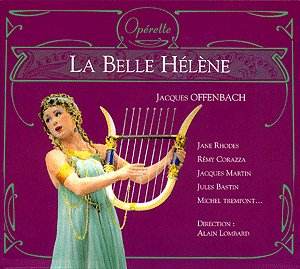This is the first Universal
release of a first class performance dating
from 1978. The singers are top-notch and are
all on form in this favourite among Offenbach’s
operettas. Although there are recordings currently
available this recording should certainly
be placed amongst the top.
Parisian Jacques Offenbach
took the examples of Auber and Lecocq and
moulded these into ‘Opéra Bouffe’,
a bright and captivating style which was very
successful in Parisian theatres. Its popularity
rose to a zenith between 1850 and 1870 and
the composer became equally popular in both
Germany and Britain.
The overture used here is
the shortened version and this runs into the
opening chorus with good pace. The enchanting
entr'acte to Act II is nicely played yet pedantic:
a rallentando leading into the waltz is rather
forced and obtrusive. The choir of girls at
the start of Act II sounds lethargic and lifeless
rather than dreamy. Again the Entr’acte to
Act III is similarly laboured, but this time
things wake up with the choir’s opening chorus,
Dansons, buvons. The duets and arias
are all delivered excellently and at the pace
one would usually expect.
La Belle Hélène
has three other recordings to its credit:
This version compares well with the 1986 Plasson
performance with Norman/Aler/Burles [CDS 747
157-8] both in singing and musical representation.
A younger and fresher Burles also features
as the lead in an earlier EMI Marty recording
[EMI
574 085-2] where a trimmed overture and
voice-over narration may not be to everyone’s
liking, particularly if you’re not French.
A recent Swiss DVD recording (Zurich Opera)
with Harnoncourt is not available for comparison.
[There is also a Virgin
Minkovsky recording also on TDK
DVD- Len]
The singers here are in very
good form: a confident Rhodes sings Hélène
with authority and feeling (CD1 tk15), but
held notes can be insecure and I don’t think
any upward glides are found in the score.
Pure-toned tenor, Corazza, with light vibrato,
is superb and provides the air of innocence
expected of Pâris (CD1 tk6). The march
‘Kings of Greece’ has an unspectacular
start but later gathers momentum.
Initially, the recording
sounds too rich in treble but this distraction
does not last. The singers and orchestra are
well balanced but the choir is generally too
distantly placed.
As is often customary with
French CDs, the jewel case has been replaced
by an attractive colourful folding card box.
The booklet gives brief background information
on Offenbach as well as the book’s lyricists,
Meilhac and Halévy. A succinctly written
synopsis is provided and, like the notes,
is in French alone.
The box carries details of
other French operettas in the series, and
some of these will be of particular interest
since they are indeed rare recordings and
if up to the standard of this recording will
be well worth investigating: La Mascotte
(Audran) [465 877-2]; La Cocarde de
Mimi Pinson (Goublier) [461 964-2]; Dede
(Christiné) [461 961-2]; Phi-Phi
(Christiné) [465 886-2; Là-Haut
(Yvain) [461 967-2]; La Grande Duchesse
de Gérolstein (Offenbach) [465
871-2]; La Fille du Tambour Major (Offenbach)
[461 673-2].
Raymond Walker


